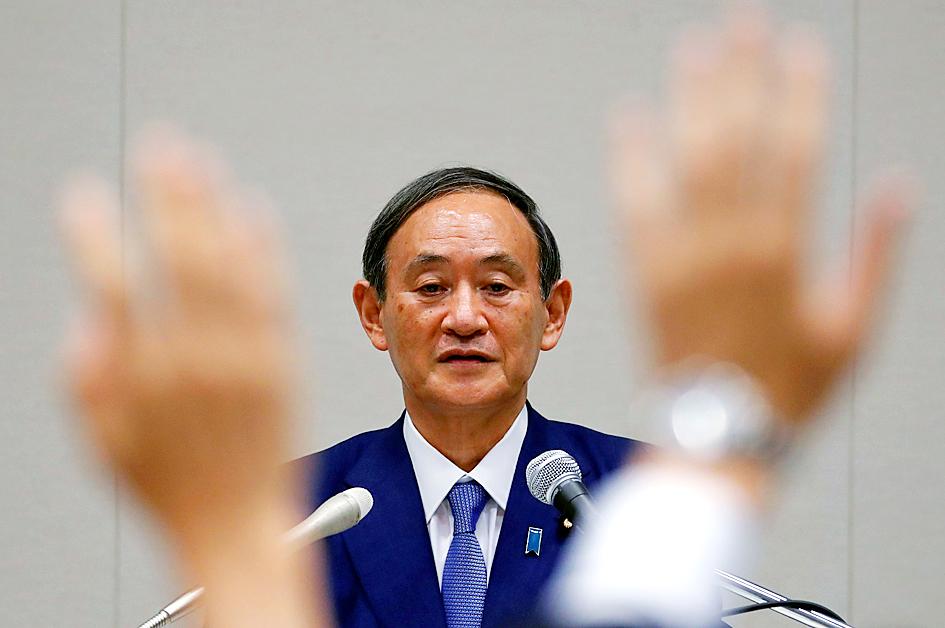Japan’s ruling party plans on Sept. 14 to vote on Japanese Prime Minister Shinzo Abe’s replacement, an official confirmed yesterday, as Japanese Chief Cabinet Secretary Yoshihide Suga formally announced his bid to become the country’s next prime minister, with growing party support making him the race’s clear favorite.
A vote in parliament — expected to endorse the Liberal Democratic Party’s (LDP) new leader — is likely to follow on Sept. 16.
The new prime minister will face a raft of challenges, from the COVID-19 pandemic to a tanking economy, as well as ensuring that the postponed Tokyo Olympic Games can go ahead.

Photo: Reuters
Key LDP factions have already thrown their support behind Suga, who pledged to “do my utmost to continue the work of party leader Abe, who poured his spirit and strength into the job.”
Two other candidates, former Japanese minister of defense Shigeru Ishiba and LDP Policy Research Council chairman Fumio Kishida, have so far announced plans to stand.
Abe, Japan’s longest-serving leader, kicked off the race when he said last week that he would step down over health problems.
The LDP has opted for a scaled-back vote that would not include rank-and-file members.
Instead, only its lawmakers and three representatives from each of the country’s 47 prefectures are to vote.
The decision has elicited some criticism, but party officials said that it would take too long to organize a broader vote.
Experts said the format favors Suga, 71, who has built an effectively insurmountable lead in the race already.
His selection “is increasingly assured, as the LDP’s factions — with the exception of the factions headed by rival candidates Shigeru Ishiba and Fumio Kishida — have lined up behind Suga,” Tobias Harris, a Japan expert at Teneo consultancy, said in a note.
Suga has held his key post for years — coordinating policy among ministries and agencies, and serving as the effective face of the government as its chief spokesman.
Considered a pragmatic politician, he is a close Abe adviser who encouraged the prime minister to run again after a disastrous first term in office ended after just a year in 2007.
Kishida, 63, a former foreign minister, was previously considered Abe’s favored successor, but the outgoing prime minister has said that he would not endorse a candidate, and Kishida’s limited public profile is likely to leave him struggling to challenge the likes of Suga.
Ishiba, 63, polls well with the general public, but is less popular among party members.
He once left the LDP — spending time as an independent and briefly joining another party — and many within the ruling bloc have not forgiven the political dalliance.

Drug lord Jose Adolfo Macias Villamar, alias “Fito,” was Ecuador’s most-wanted fugitive before his arrest on Wednesday, more than a year after he escaped prison from where he commanded the country’s leading criminal gang. The former taxi driver turned crime boss became the prime target of law enforcement early last year after escaping from a prison in the southwestern port of Guayaquil. Ecuadoran President Daniel Noboa’s government released “wanted” posters with images of his face and offered US$1 million for information leading to his capture. In a country plagued by crime, members of Fito’s gang, Los Choneros, have responded with violence, using car

The team behind the long-awaited Vera Rubin Observatory in Chile yesterday published their first images, revealing breathtaking views of star-forming regions as well as distant galaxies. More than two decades in the making, the giant US-funded telescope sits perched at the summit of Cerro Pachon in central Chile, where dark skies and dry air provide ideal conditions for observing the cosmos. One of the debut images is a composite of 678 exposures taken over just seven hours, capturing the Trifid Nebula and the Lagoon Nebula — both several thousand light-years from Earth — glowing in vivid pinks against orange-red backdrops. The new image

CYBERCRIME, TRAFFICKING: A ‘pattern of state failures’ allowed the billion-dollar industry to flourish, including failures to investigate human rights abuses, it said Human rights group Amnesty International yesterday accused Cambodia’s government of “deliberately ignoring” abuses by cybercrime gangs that have trafficked people from across the world, including children, into slavery at brutal scam compounds. The London-based group said in a report that it had identified 53 scam centers and dozens more suspected sites across the country, including in the Southeast Asian nation’s capital, Phnom Penh. The prison-like compounds were ringed by high fences with razor wire, guarded by armed men and staffed by trafficking victims forced to defraud people across the globe, with those inside subjected to punishments including shocks from electric batons, confinement

Canada and the EU on Monday signed a defense and security pact as the transatlantic partners seek to better confront Russia, with worries over Washington’s reliability under US President Donald Trump. The deal was announced after a summit in Brussels between Canadian Prime Minister Mark Carney and European Commission President Ursula von der Leyen and European Council President Antonio Costa. “While NATO remains the cornerstone of our collective defense, this partnership will allow us to strengthen our preparedness ... to invest more and to invest smarter,” Costa told a news conference. “It opens new opportunities for companies on both sides of the